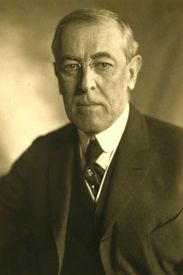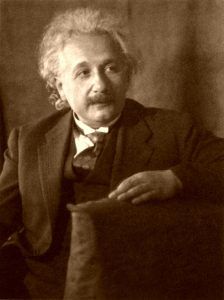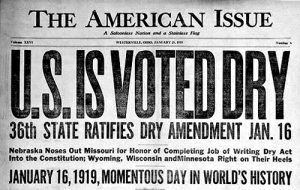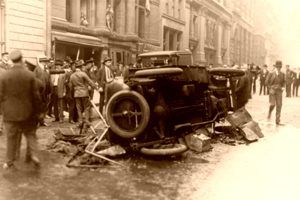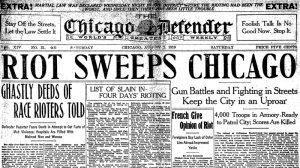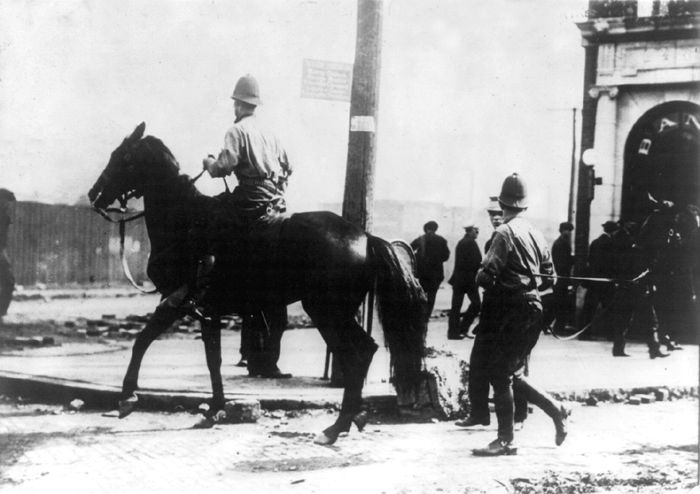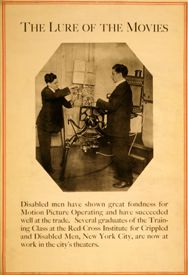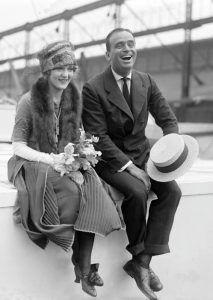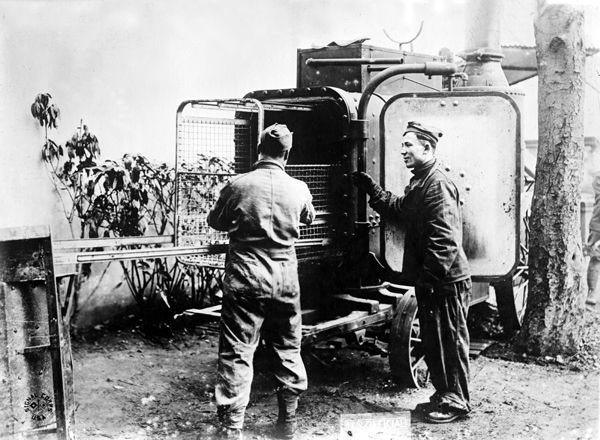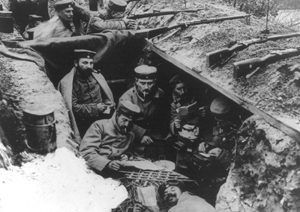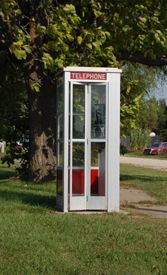“I can predict with absolute certainty that within another generation, there will be another world war if the nations of the world do not concert the method to prevent it.”
— Woodrow Wilson, Omaha, Nebraska, September 8, 1919
World War I was over, and most Americans were eager for peace and security, but 1919 would prove to be anything but. Revolution and unrest ran rampant across Europe and North America; the Flu Pandemic continued from the prior year with a third brutal wave in the Spring; terrorist bombings rocked seven U.S. cities in June, the first of a series of “Red Scares” began when the government passed an act that blacklisted anyone thought to be involved with communism, race riots rocked the nation, and hundreds of workers went on strike across the country. The adoption of constitutional amendments giving women the vote and establishing Prohibition denoted the high-water mark of the moral impulses of the Progressive era.
Voters grew disillusioned during the Wilson years, with many feeling the President and the Progressives went too far. The terrorist bombings further alienated people from the government. World War I did more to feed these ideals as citizens questioned the reasons and results of the conflict. In 1920, America elected Warren Harding with over 60% of the vote, and Progressive Democratic candidates suffered for Wilson’s sins and the events from 1919.
Many historians today summarize 1919 as rivaling 1968 as the worst year in twentieth-century American history.
Here’s a look at the year 1919.
U.S. Statistics
President: Woodrow Wilson
Vice President: Thomas R. Marshall
Population: 104,514,000
Federal spending: $18.49 billion
Consumer Price Index: 17.3
Unemployment: 1.4%
1919 Timeline
Year in General
After moving from its southern rural roots, jazz established Chicago, Illinois, as its capital. The city would become home to jazz greats such as trumpeter Louis Armstrong and pianist Jelly Roll Morton.
One hundred eighty-five thousand four hundred forty people died in the third wave of the Flu Pandemic.
The American Telephone and Telegraph Company introduced dial telephones. The first rotary dial telephones in the Bell System were installed in Norfolk, Virginia.
Albert Einstein’s theory of general relativity was confirmed when the Royal Astronomical Society saw the predicted effect during a solar eclipse.
Eighty-three African-Americans are lynched–many of them soldiers returning home from World War I. At the same time, the Ku Klux Klan is operating out of 27 states. The NAACP published the pamphlet Thirty Years of Lynching in the United States: 1898-1918. The report appeals to lawmakers to end the social, political, and economic terrorism associated with lynching.
The pop-up toaster, short-wave radios, and arc welders were invented in the U.S. in 1919.
The most popular baby names for boys were John, William, James, Robert, and Charles. For girls, Mary, Helen, Dorothy, Margaret, and Ruth.
January 1 – Edsel Ford succeeds his father as head of the Ford Motor Company.
January 6 – Theodore Roosevelt, the 26th President of the United States, died in his sleep at the age of 60.
January 15 – The Boston Molasses Disaster: A wave of molasses released from an exploding storage tank sweeps through Boston, Massachusetts, killing 21 and injuring 150.
January 16 – The 18th Amendment to the United States Constitution, authorizing Prohibition, goes into effect in the United States.
January 25 – The Hotel Pennsylvania was built in Manhattan, New York, and became the world’s most popular hotel.
February 5 – Charlie Chaplin, Mary Pickford, Douglas Fairbanks, and D.W. Griffith launch United Artists to control their work.
February 6 – After two years of World War I wage controls, the Seattle General Strike began. With more than 65,000 workers in Seattle, Washington, the five-day general work stoppage lasted from February 6 to February 11.
February 11 – The Seattle General Strike ends when Washington’s Attorney General summons federal troops.
February 25 – Oregon places a 1¢ per U.S. gallon tax on gasoline, becoming the first U.S. state to levy a gasoline tax.
February 26 – An act of the United States Congress established most of the Grand Canyon as a United States National Park.
The first natural lands east of the Mississippi River were established as a national park in legislation signed into law by President Woodrow Wilson. The area, known as Lafayette National Park in Maine, is located at Mount Desert Island and is known as Acadia National Park.
March – The Red Scare began when Vladimir Lenin started a revolution in Russia that changed the Russian government to communism. As a result, the U.S. passed an act that would blacklist anyone involved with communism.
March 5 – A. Mitchell Palmer becomes Attorney General of the United States through a recess appointment.
March 15 – The American Legion forms in Paris.
April 13 – Eugene V. Debs enters prison at the Atlanta Federal Penitentiary in Atlanta, Georgia, for speaking out against the draft during World War I.
April 15 – The Boston Telephone Strike begins. It ended successfully for the telephone operators and supporters on April 20.
April 30 – Several bombs were intercepted in the first wave of the 1919 United States anarchist bombings.
May 1 – The May Day Riots of 1919 was a series of violent demonstrations throughout Cleveland, Ohio when Socialist leader Charles Ruthenberg organized a May Day parade of local trade unionists, socialists, communists, and anarchists to protest the jailing of Eugene V. Debs. Debs was a union leader, one of the founding members of the Industrial Workers of the World, and five times the candidate of the Socialist Party of America for President of the United States. Two people were killed, 40 were injured, and 116 were arrested.
May 8 – A United States Navy seaplane begins the first transatlantic flight, making stops in Newfoundland and the Azores before touching the ground in continental Europe in Lisbon, Portugal, on May 27.
May 10 – Following postwar social tensions related to the demobilization of veterans of World War I and competition for jobs among whites and blacks, the first race riot of what became known as Red Summer occurred in Charleston, South Carolina. Before it had ended, riots would erupt in 26 U.S. cities through the summer and fall of the year. In most instances, whites attacked African Americans. In some cases, many blacks fought back, notably in Chicago, where, along with Washington, D.C., and Elaine, Arkansas, the most significant number of fatalities occurred. The riots were extensively documented in the press, which, along with the federal government, conflated black movements with Bolshevism. “Armed resistance” movements started as a response to the riots.
June 2 – In seven U.S. cities, eight mail bombs were sent to prominent figures during the anarchist bombings. All eight bombs exploded within approximately 90 minutes of one another, rocking some of the most significant urban areas in America, including New York City, Boston, Pittsburgh, Cleveland, Washington, D.C., Philadelphia, and Patterson, New Jersey.
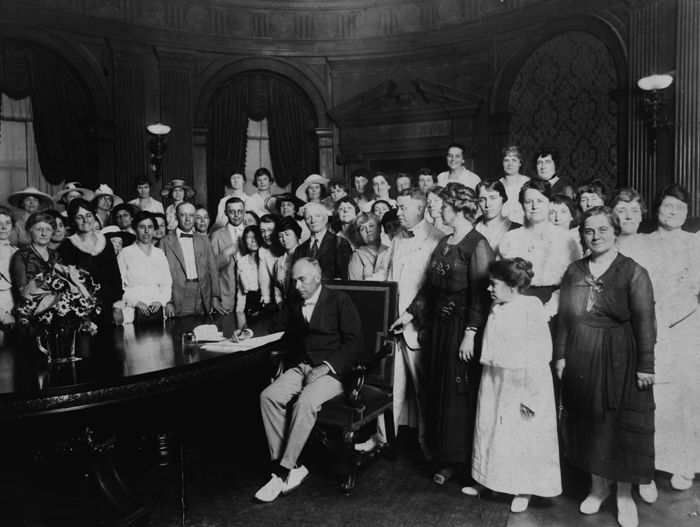
Missouri Governor Gardner signed a resolution ratifying the Amendment to the U.S. Constitution granting women the right to vote by Carl Deeg 1919.
June 4 – The United States Congress approved the 19th Amendment to the United States Constitution, which would guarantee suffrage to women, and sent it to the U.S. states for ratification.
June 15 – Pancho Villa attacked Ciudad Juárez. When the bullets begin to fly to the U.S. side of the border, two U.S. 7th Cavalry Regiment units cross the border and repulse Villa’s forces.
June 28 – The Treaty of Versailles was signed, and World War I ended.
July 2 – The cost of a first-class stamp rises from 2¢ to 3¢.
July 6 – The British airship R34 lands in New York, completing the first crossing of the Atlantic by an airship.
July 7 – September 6 – The First Transcontinental Motor Convoy, which crossed the country using the incomplete Lincoln Highway from Washington, D.C., to San Francisco, California, was designed to determine how well motor vehicles could move troops from one side of the country to the other.
July 21 – The Wingfoot Air Express catches fire over downtown Chicago; two passengers, one crew member, and ten people on the ground were killed. Two others were able to parachute to the ground safely.
July 27 – The Chicago Race Riot of 1919 began when a white man threw rocks at a group of four black teens on a raft.
August 11 – The first N.F.L. team for Wisconsin (the Green Bay Packers) was founded by Curly Lambeau.
August 30-31 – After a three-way splintering of the Socialist Party of America, the leadership of the remaining 30,000 members of the Right Wing of the Socialist Party continued their national convention in Chicago, Illinois. The leadership of the 10,000 native-born English-speaking members of the Left Wing formed the Communist Labor Party of America on August 31, 1919.
September 9 – About three-quarters of the Boston police force goes on strike. Massachusetts Governor John Calvin Coolidge quickly dismissed the strikers, saying that no one has the right to strike against public safety.
September 10-15 – The Florida Keys Hurricane kills 600 people in the Gulf of Mexico, Florida, and Texas.
September 21 – The Steel Strike of 1919 began across the United States. It collapsed on January 8, 1920.
September 26 – For the duration of the First World War and its immediate aftermath, the railways were removed from the control of private companies and managed by the National Government. In March 1919, the government announced its plans to standardize and reduce the wartime pay rates. After failed negotiations with the unions, the second national rail strike began at midnight on September 26-27, 1919. It lasted for nine days.
September 28 – Omaha Riot: A lynch mob besieges the police station and courthouse in Omaha, Nebraska, and lynches alleged rapist Will Brown.
October 1 – The Elaine Race Riot breaks out in Arkansas.
October 2 – President of the U.S. Woodrow Wilson suffered a massive stroke, leaving him partially paralyzed. The stroke incapacitated the president, his wife controlled access, and he remained in office, though he should have been removed. He worked minimally during the remainder of his term but did approve the Palmer Raids. Essentially, the country ran without a president for nearly 18 months. The public turned on Wilson over the assault on civil liberties, World War I, and the events of 1919, resulting in a humiliating rebuke in the 1920 election.
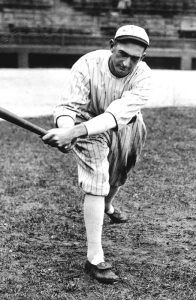
Chicago White Sox outfield “Shoeless Joe” Jackson was a prominent figure in the 1919 World Series scandal.
October 9 – In the first major scandal in Major League Baseball, and to this day, the worst, nine players from the Chicago White Sox threw the World Series to the Cincinnati Reds. It is forever known as the Black Sox Scandal, with players, such as immortal Shoeless Joe Jackson, banned from the game and Hall of Fame.
The Boston Police Strike occurs.
October 16 – Ripley’s Believe It or Not! first appeared as a cartoon under this title in The New York Globe.
October 28 – Prohibition begins: The United States Congress passed the Volstead Act over President Woodrow Wilson’s veto.
November 7 – The first Palmer Raid is conducted on the second anniversary of the Russian Revolution. Over 10,000 suspected communists and anarchists were arrested in 23 different U.S. cities.
November 9 – Felix the Cat appears in Feline Follies, making the first cartoon character.
November 10 – The first national convention of the American Legion is held in Minneapolis, Minnesota.
November 11 – The Centralia Massacre in Centralia, Washington, resulted in the deaths of four members of the American Legion and the castration and lynching of a local leader of the Industrial Workers of the World.
November 19 – The Treaty of Versailles fails a critical ratification vote in the United States Senate. The U.S. will never ratify it.
December 21 – The United States deports 249 people, including Emma Goldman, to Russia during the Red Scare.
December 26 – The Boston Red Sox sold Babe Ruth to the New York Yankees for $125,000, the most significant sum ever paid for a player at that time. The deal was announced on January 6, 1920.
December 30 – Average Grocery Price – 1 pound apples 11¢, 2 pounds roast beef 38¢, 3 pounds steak 60¢, 1 pound bread 5¢, 1 pound butter 39¢, 3 pounds chicken 19¢.
Entertainment:
Oscar Micheaux released The Homesteader, starring pioneering African American actress Evelyn Preer. He was the first African American to produce and direct a motion picture. For the next 40 years, Micheaux would become one of the most prominent African American filmmakers by producing and directing 24 silent films and 19 sound films.
Harold Lloyd began holding test screenings of his films and modifying them based on audience feedback, a technique still used today.
The number one fiction of 1919 was The Four Horseman of the Apocalypse, later made into a movie. A single copy sold for $1.90 – industry insiders felt the public would never pay $2 for a book but were happy to be proved wrong!
The Miracle Man was Lon Chaney’s breakthrough film – it first brought his physical skills and makeup abilities to the screen in his grotesque character portrayal of a fake cripple (a contorted figure named the Frog) who was healed by the title character, a faith healer named The Patriarch. Chaney became the greatest U.S. horror star of the period, collaborating with Universal and M.G.M. director Tod Browning on ten feature films from 1919 to 1929, beginning with Universal’s The Wicked Darling.
Charlie Chaplin began work on The Kid, his first feature film. His co-star will be four-year-old Jackie Coogan.
Top Grossing Films:
1. The Miracle Man, grossing $3,000,000
2. Daddy-Long-Legs
3. Madame DuBarry
4. The Roaring Road
5. When the Clouds Roll By
6. Hawthorne of the U.S.A.
7. Broken Blossoms
8. Male and Female $1,256,227
Popular Celebrities:
Dorothy Gish
Pauline Frederick
Gloria Swanson
Douglas Fairbanks
Mary Pickford
Charlie Chaplin
Rudolph Valentino
Lillian Gish
Harry Houdini
Lon Chaney
Tom Mix
New Words of 1919
The Oxford English Dictionary defined 309 words with first citations in 1919. A few of the words listed below were added to the Oxford English Dictionary in 1919, even though some had been utilized years prior.
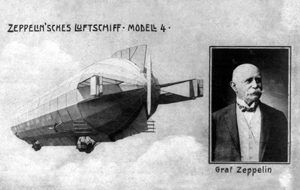
A Zeppelin is a type of rigid airship named after the German Count Ferdinand von Zeppelin, who pioneered rigid airship development at the beginning of the 20th century.
Air Freight, n. – Freight transported by aircraft was first referenced as air freight regarding Zeppelins in 1919.
Ad-lib, v. – This staple of comedy and improvisational theater appears this year. However, there is an older adverbial use of ad-lib in music, extending a musical phrase and introducing variation as the musician sees fit. Short for Latin ad libitum, literally: according to pleasure
Bagel, n. – A hard ring-shaped bread roll, spelled beigel, was first mentioned in the dictionary. The dictionary also has an 1892 citation for Beuglich. The word is from the Yiddish beygel, ultimately from the Old High German boug ring.
Bimbo, n. – A variant of the Italian bambino. Initially, this word was applied to men and was simply a contemptuous way to say “guy, fellow.” By 1927, bimbo was being applied to attractive women of limited intelligence.
Chai, n. – This entry, first cited in 1919, was marked as military slang for tea. However, the older word, cha, is from the Mandarin word for tea, whose English use dates to the early 17th century. Today, the word is commonly applied to a sweetened brew of spiced tea, especially those made in India.
Collage, n. – An abstract art form that uses clippings from various media sources not generally associated with one another, such as newspaper clippings, parts of photographs, theater tickets, etc.
Copacetic, n. – This Americanism term for “fine, excellent” was first found in print in 1919.
Cross-selling, n. – To sell or try to sell similar or related products or services to an existing customer.
Delouse, v. – To rid a person or animal of lice as a sanitary measure was first used in World War I armies.
Dunk, v. – To submerge in a liquid. Dipping something into your coffee didn’t have a name until 1919. The term is from the Pennsylvania German dunke and, ultimately, the German tunken. The verb was being used in basketball by 1937.
Encode, v. – To convert a message or information into code. The verb “decode” dates to the 1890s, but it took a few decades for its partner to appear. Computing sense is from 1955.
Fox-hole, n. – A military term from World War I, a fox-hole is a small pit dug as a shelter in a battle area, usually for one or two soldiers.
Heavy-lifting, adj. – This term came from the transportation and shipping business, like air freight. It refers to the capability to move and ship large, indivisible items. The 1919 citation refers to items weighing two metric tons, which would not be considered a job for heavy-lift today.
Jerry, n. – This is a nickname for Germans, mainly German soldiers.
Mercurochrome, n. – An over-the-counter antiseptic that was common in household first aid. In 1919, researchers from Johns Hopkins University in Baltimore, Maryland, discovered its antiseptic properties. In 1998, after a run of nearly eighty years, the U.S. Food and Drug Administration halted its sales in the United States because it contains mercury. It’s still available in other countries.
Naugahyde, n. – Naugahyde is a fabric covered with a rubber or vinyl resin and finished to resemble leather. It derives its name from Naugatuck, Connecticut, where it was initially manufactured.
Offline, adj., and adv. – This word, popular in network computing today, began in 1919 in railroad operations, including ticketing, planning, and administration conducted in offices some distance from the rail lines. The computing sense didn’t appear until 1950.
One-world, adj. – In the aftermath of World War I, the idea that we all live on a single planet and that we shouldn’t let political considerations divide us gave rise to the League of Nations.
Payphone, n. – The word payphone was new in 1919, but the concept was not. The pay telephone dates to 1917, and pay stations, where one could pay to make a telephone call, appeared as early as 1888.
Penne, n. – In 1919, you could start ordering penne pasta and expect English-speaking waiters to understand you. The word is from the Italian word for feather, as the tube-shaped pasta resembles a quill shaft.
Phooey, int. – People have probably been making this sound since before there was language, but in 1919, it got a new name.
Pokey, n. – This American slang term, meaning “prison, jail,” appears in the dictionary this year. It’s from the somewhat older pogey, a term dating to 1891 that means “poorhouse” or “home for the disabled.”
Radio, v. – The noun was only a little over a decade old and was verbed in 1919.
Recharger, n. – With the continued rise of electric-powered devices, this word was invented for devices that revitalize batteries. Its original use was about automobile batteries.
Semi-trailer, n. – Semi-trailers were new in 1919.
Snookums, n. – A trivial term of endearment usually applied to children or lap dogs. The dictionary compares it with Diddums (1893) and Snooks (1860).
Spooking, n. – Between World War I and the influenza outbreak, some forty-six million people met untimely ends in less than five years. One inevitable result was a rise in spiritualism and the occult as hucksters and cheats preyed on the bereaved, offering to contact their lost loved ones. Spooking was a term that came out of this trend, referring to a séance or an invoking of spirits.
Supercharge, v. – This term arose from advances in automotive and aircraft technologies. 1919, originally of internal combustion engines,
Supersonic, adj. It would be decades before humans created a vehicle that exceeded the speed of sound. Still, in 1919, it was possible to accelerate particular objects, such as bullets, faster than sound, and engineers had invented a term for it.
White-collar, n. and adj. – This term for a worker engaged in non-manual labor first appeared in Upton Sinclair’s 1919 The Brass Check, which is about journalism. The term “blue-collar” doesn’t appear until 1950.
Wonky, adj. – Slang for shaky, groggy, unsteady, unreliable, or untrustworthy. It is mainly used for electrical devices and machinery. Its sense meaning “bookish, nerdy” appeared in 1978.
Compiled and edited by Kathy Alexander/Legends of America, updated March 2024.
Also See:
Women’s Suffrage in the United States
Sources:
America’s Best History
Dictionary Reference
Examiner.com
Infoplease
Macro History
Word Origins
Wikipedia


